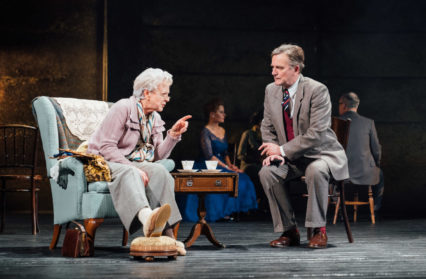Thomas Tyrrell travelled to the New Theatre for Wales Millennium Centre’s new stage adaptation of Agatha Christie’s The Mirror Crack’d.
Recent Agatha Christie adaptations have felt like they’re the work of totally different authors. The BBC has committed itself to a grimdark Christie of the dystopian past: the 30s of The ABC Murders (2018) is all filthy boarding houses and fascism, the 50s of Witness for the Prosecution (2016) suffused with smog and shellshock. Meanwhile, the latest Hollywood version of Murder on the Orient Express (2017) is so glitzy and stylised as to be fast approaching steampunk.
In this polarised market, Rachel Wagstaff’s stage adaptation of The Mirror Crack’d opens by giving us the new and terrifying prospect of a Miss Marple mystery told through interpretive dance. As the silver-haired detective dozes in her armchair, we’re subjected to a panorama of sixties culture, from mini-skirts to teddy boys to mods vs rockers gang warfare. At the crux of the sequence the spinster sleuth, immobilised throughout by a sprained ankle, hops into centre stage and vainly tries to dance the jitterbug.
The relief when this sequence is over and the play settles down is palpable, but it does a fine job of introducing us to Miss Jane Marple, a woman of another age both intrigued and alienated by the pulse of the sixties. It also softens us up for the next bit of inventive staging. When newly promoted Chief Inspector Craddock arrives to discuss a recent murder with his Aunt Jane, the suspects, witnesses and victims begin to wheel around Marple’s armchair, re-enacting the conversations, collisions and confrontations that led up to the death of Heather Leigh—poisoned by strawberry daiquiri.
John Lanchester in the London Review of Books recently made a convincing case for Christie as the greatest formalist novelist of the twentieth century, and this staging really exploits the appeal of the most characteristic element of any Christie novel—neither the detective, nor the setting, but the mystery itself. As the secrets and lies begin to emerge, the continually re-enacted events of the murder take on the quality of a dance, seen each time from a different perspective and with a different understanding. It’s also a brilliant way of converting Christie’s slew of unreliable witnesses to the stage—each character sees the scene from their own point of view, limited by what they can hear, and each re-staging teases out a few more fragments of conversation or a new interpretation of a familiar gesture. It’s easy to sniff out a few of the red herrings, but the final solution to it all is a satisfyingly unexpected twist.
Susie Blake doesn’t try to reinvent the role with new gimmicks or invented backstory, but gives us Miss Marple, as Christie wrote her, a delightful, sharp witted old lady who is overlooked at peril. She shines in her scenes with Simon Shepherd’s pompous, brusque yet fundamentally good-hearted Chief Inspector Craddock, and with her best friend Dolly Bantry, who Julia Hills raises from the comic relief of the earlier acts into a perceptive and sympathetic confidante. Some of the other actors struggle to add a new spin to the usual suspects, such as a film-mogul husband, an excitable Italian waiter, and a resentful secretary, but the distinction is Suzanna Hamilton as Martina Gregg, the ageing film star the poisoned daiquiri was originally intended for. Hers is the performance the success of the play hinges on, and she delivers with panache. After the murderer is unveiled, the wrapping up of the loose ends takes perhaps a little too long and involves a little too much melodrama, but the catastrophe is so artfully wrought that such quibbles are soon forgotten.
In the director’s note for The Mirror Crack’d, Melly Still speaks of ‘a blurred memory stemming from childhood, a sense that Agatha Christie, like Enid Blyton, was somehow to be avoided.’ If your notion of Christie is still one of cosy tea-time murders with a side order of antisemitism, this wittily staged and beautifully crafted play shows just how good the Queen of Crime can be.
You might also like…
Frances Spurrier reviews The Chicken Soup Murder by Maria Donovan, a book with heart which posits an interesting idea but doesn’t quite live up to its title.
Thomas Tyrrell is a regular contributor to Wales Arts Review.












